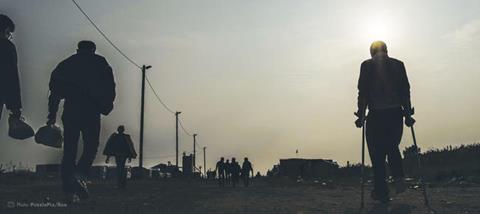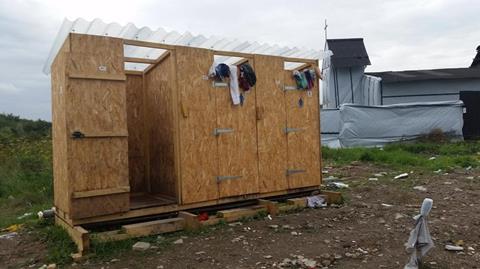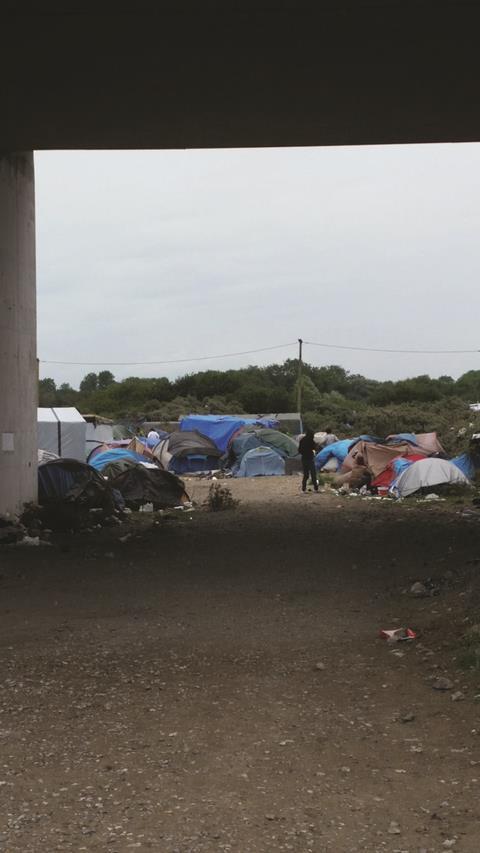
'I cannot fathom this'
I went to France and I met the world. As I helped distribute 500 food parcels and walked around the square mile of camp, I was greeted by people from all over the globe. Many areas consisted of basic, temporary and fragile tents, but other areas were clearly becoming more permanent: wooden walls and corrugated iron roofs replacing tarpaulin sheets. Thousands of people of numerous nationalities coexist seemingly peacefully, residing close to those they have most in common with, but helping all who arrive. Basic amenities such as toilets and taps have been enhanced by entrepreneurial individuals whose resolution, ingenuity and desire to contribute to society has enabled them to open shops, cafes, hairdressers, churches and mosques. If this was a flight away I could have put it in a compartment in my brain, but this scene of life is barely 50 miles from my front door. I cannot fathom this.
I have followed the growth of this new urban community for some years, but it was David Cameron who provoked me to get on the Eurotunnel and search for truth. Amid the rising sensationalist rhetoric of fear, his profoundly dehumanising swarm narrative made me angry and determined to seek truth. The beautiful volunteers who have faithfully served this vulnerable community for years, the legacy of former residents (where are they now?), and the welcome of the current residents showed me that these brothers and sisters are not dangerous, but in danger. The dominant narrative needs to be challenged. Their stories need to be heard. We all need a place to call home.
Rev Juliet Kilpin is the coordinator of Urban Expression.
‘talk of being trafficked was commonplace’
There were a number of things that really hit me. The first was how commonplace talk of traffickers was. In the space of about 20 minutes, six people had told me how they were being trafficked in the next few days, some spending up to €4,000 just to attempt to get to the UK. One 21-year-old from Afghanistan simply said: ‘I’m young so if I die trying, I leave no family. If I survive, I can start a family.’
The second thing that I could not get over was the fact that this was in France. Only 45 minutes from the UK are people who have left their country because of war, terror, political regimes and the need to survive. A response of food, clothing, shelter, conversation and prayer was a simple one, and 24 hours later I am convinced it was one of the most challenging days off I’ve ever had.
Alex Rayment is studying for ordination and works at St Paul’s Church, Cheltenham.

‘They’re human!’
For months I had been watching the news about the ‘migrant crisis’ and was getting increasingly angry that no one seemed to be willing to help these people. ‘They’re human! They’re refugees!’ I’d shout at the TV, frustrated that people seemed to care more about statistics than providing them with somewhere safe to live. When we arrived it was time for food to be distributed. There were several hundred people in the line when we began handing out the food. It must be really difficult to admit that you need help and to receive basic necessities such as food from the back of an aid truck, but these people took the packets of biscuits I was handing out with a smile and a thank you. Afterwards I got chatting to some ladies from Eritrea. They told me it had taken two months for them to get to Calais, on foot and by bus.
There were lots of tents; some people had made more permanent structures with wooden planks and plastic sheeting. With winter coming, I can’t imagine these shelters provide much warmth. I kept reminding myself that I was in France, only a train journey away from the UK, yet the scenes I was witnessing could have been from a refugee camp in a developing country. How can we allow this to happen on our doorstep and not do anything about it?
Grace Claydon is a student.
‘god’s heart breaks for these people’
I have found myself describing our time in Calais as beautiful, heart-breaking, joyful and worship-filled. Across the site are many beautiful buildings. Some are wonderfully creative structures using the most simple and basic supplies that wouldn’t seem out of place at a summer festival or one of those alternative homes programmes. Artwork pops up in the most unexpected places and creativity is in abundance.
Amid all of this is a fair amount of heartbreak. It was frustrating to see no waste management or sanitation on site. Without these basic needs, everyday life is extremely difficult and it won’t be long before people in the camp will get ill. There must be an organisation with skills in this area that could help with this need.
I won’t forget the way my heart felt when a six-year-old boy looked me in the eye and asked me to take him home with me. I explained that I would get in trouble with the police if I did that but he cut me short with his response of, ‘But the police want me dead.’ My heart, God’s heart, breaks. The colouring book we gave him seemed so insignificant!
Laughter isn’t what you expect to hear in this context, but people are joyful. Despite the tragic situations that have unfolded and led to people reaching Calais, the camp has a joyful atmosphere. Life was happening all around us. People were happy to see us and chat; it was a privilege to be able to share moments of joy with them. In St Michaels, the church on site, the presence of God is tangible. Stripped back, simple worship fills the space day and night providing safety and sanctuary, a real testimony to the faith of the indigenous leaders on the camp. As a church leader it has given me much to reflect on!
Gemma Dunning is children, youth and families pastor at West Cliff Baptist Church.

‘all human life is equal’
The current situation in Calais has been regularly spoken of in the news and a lot of people have been voicing strong opinions over the subject. I became increasingly curious to go and see what is happening out there for myself.
The camp was very different from what I was expecting and I was not able to prepare myself for the number of people forced to live in such inhumane conditions. Their temporary homes typically consisted of tents and tarpaulincovered wooden frames to simulate huts. Their school is one classroom-sized hut, which they have had to build by hand, and their toilets are mainly wooden cubicles with not much else inside them, dotted around the campsite.
Many people explained that they’ve been forced to leave their countries as it is no longer safe for them to live there (the reasons were all varied, but the result was the same). While asking some people why they were looking to make it to England, some of the responses were interesting. A lot of the answers were along the lines of seeking asylum within the UK as the process for seeking asylum in France takes far too long, just for the government to turn around and deny their asylum.
I’ve had a lot of UK-based people question what we’ve done, many asking, ‘Why aren’t you helping the homeless in your own country?’ And all I have to say to these people is that human life is equal. It doesn’t matter who you are, where you live or your background; if you are a human then you have every right to resources, food, clothing and shelter.
Rhys Shore Dunning is an 18-year-old music student from Bournemouth.
‘how can we demonise someone who is so similar to us?’
During my time in the camp I heard countless stories of loss, poverty and desperation. Often fleeing war-torn countries through fear for their lives, these people long for stability and education in England. They have trekked thousands of miles, leaving friends and family behind just for a glimpse of the border that gives them hope, only to find that Britain won’t have them, France doesn’t want them and the world will ignore them. The least I could do was help.
When we arrived at the distribution centre run by Pascal it quickly became clear that the problem wasn’t a lack of supplies but a lack of logistical support and manpower. At 56, Pascal told us he was the youngest in a team of eight who were solely responsible for sorting the clothes distribution for the 4,000 refugees. Big aid organisations like Oxfam and the UN are largely absent because the situation is simply too politically charged, but the need for their support is paramount.
Despite their fractured pasts, the parallels that can be drawn between the hopes and dreams of the migrants and British citizens are explicit: we all long for education, a job and a stable family, and this was something that really hit me: how can we demonise someone who is so similar to us? When the pastor of the camp’s church exclaimed, ‘Our skin may be different colours but we are all one blood,’ I couldn’t help but feel embarrassed by the demonising rhetoric being used by some people back home about the individuals I have met.
It’s very easy to focus on the burdens that these refugees may bring with them, but from what I have seen, their contribution to our culture, creativity and hospitality would be priceless.
Matt Dominey is a 17-year-old from Westcliff-on-Sea.






































